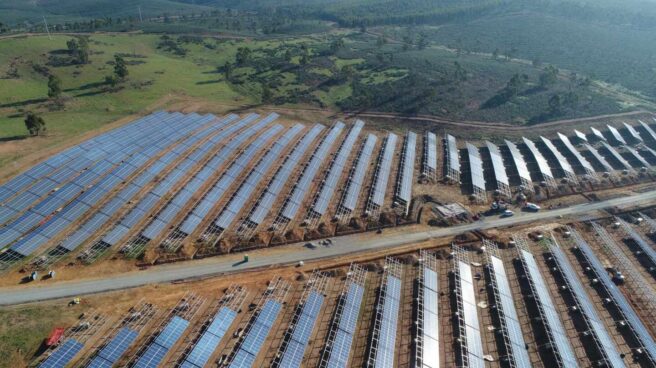

Photovoltaic solar power plant.
The photovoltaic sector hopes that countries participating in COP28 will “commit to tripling renewable energy capacity.” COP28, the United Nations Climate Change Conference, is an annual event held this year in Dubai, United Arab Emirates, to take action and combat the global climate crisis.
Each year also takes stock of the progress set by the Paris Agreement and outlines the plan that needs to be implemented to reduce polluting emissions into the environment. COP28, like previous ones, will bring together heads of state, ministers, climate activists and representatives of civil society, among others.
Just as the previous appointment left much to be desired, this one is not off to a good start, and the fact is that the choice of location is curious, to say the least, since the United Arab Emirates is a country whose source of wealth lies in fossil fuels.
While the interest generated by this Summit increases, certain doubts are also generated, and the fact is that the latest editions have been shrouded in the shadow of futile promises. Many good intentions fail to materialize into actions or measures decisive enough to stop climate change and the rise in global temperatures.
According to the UN, “to maintain a tolerable climate, coal, oil and gas production must be reduced as quickly as possible, and the capacity of renewable energy sources (wind, solar, hydro and geothermal) must be tripled by 2030.”
For this reason, the main goal of this year’s Summit is to discuss whether it is possible to increase the amount of renewable energy sources so that energy production comes mainly from them. Another issue that will certainly be more difficult to resolve is the issue of fossil fuel financing and ending any kind of aid to these industries. To achieve this goal of tripling renewable energy, 10,000 gigawatts of renewable energy must be installed worldwide by 2030, up from 3,000 gigawatts currently, according to the International Renewable Energy Agency (Irena), which meant would be adding 1000 GW per year.
Last year, industries such as photovoltaics found the agreements reached at COP27 in Egypt insufficient. The authoritative voice of the solar energy sector in Spain, the Spanish Photovoltaic Union (UNEF), has expressed its disappointment and concerns about its results regarding the goals of replacing fossil fuels with renewable sources as a strategy to reduce global CO2 emissions and curb global emissions. warming.
Its CEO then identified it as a summit “on the defensive regarding CO2 reduction targets” and whose agreements demonstrated a “loss of ambition and awareness of the energy transition”.
This publication has therefore once again consulted the association, which represents more than 95% of companies in the photovoltaic sector in Spain, regarding expectations from this new summit and what we can expect from it. According to José Donoso, Director General of UNEF and President of the Global Solar Energy Council, “The success of the COP must be measured against the time over which decarbonization is expected to be achieved, which implies making clear commitments to divest from fossil fuels. In addition, it is critical that countries participating in the COP commit to tripling their renewable energy capacity by 2030. In addition, we believe that it is critical to establish adequate financing mechanisms for developing countries to provide them with sufficient financing. and sustainable electrification.”
Regarding the goal of tripling the installed capacity of renewable energy sources by 2030 and the phase-out of fossil fuels, which is a fundamental part of the meeting, Spain’s position is clear. On the one hand, in this edition and on the occasion of the Spanish Presidency of the Council of the European Union, the position of the member states will be defended by Minister Teresa Ribera within the framework of her six-month presidency of the Council of Energy and Environment. adviсe.
Ribera will defend, among other things, the ability to triple installed renewable energy capacity by 2030, a goal already included in the PNIEC.
Regarding UNEF’s position, Donoso believes that “Spain currently already has a strategy in line with the goal of tripling the penetration of renewable energy sources by 2030. In our case, we have the Integrated Energy and Climate Plan, which was recently reviewed by the Ministry of Green Transition. and “Demographic Challenge” and this meets the demands that the global PV sector is making in this COP.”
Renewable Energy
Stopping global warming is the main goal of the parties included in the Constitutional Court, but the task is one thing, and the measures necessary to achieve it are quite another.
According to Donoso, renewable energy sources have the potential to stop the rise in global temperatures, but of course, “achieving this comes with significant challenges, such as achieving social consensus on the importance and need for decisive action against climate change. We all need to recognize the need to address the climate emergency in our decision-making processes. It is important that we all work together to achieve greater public acceptance of renewable energy.”
The sector’s main voice therefore seeks to ease administrative barriers, prioritize investments in storage infrastructure, network optimization and renewable hydrogen production, or develop adequate reward systems that at the same time guarantee a return on investment. competitive price.
Regarding the role that every citizen can play as part of their commitment to combating climate change, Donoso is committed to the principles of self-consumption, and he argues that promoting this approach is “the best way for citizens to contribute to the fight against the climate emergency.”
Source: El Independiente